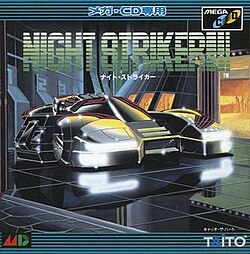Night Striker
| Night Striker | |
|---|---|

Mega CD cover art
|
|
| Developer(s) | Taito |
| Publisher(s) | Taito |
| Director(s) | Kenji Kaido |
| Producer(s) | Tohru Sugawara |
| Composer(s) | Masahiko Takaki |
| Platform(s) | Arcade, Mega CD, Saturn, PlayStation |
| Release |
Arcade
|
| Genre(s) | Shoot 'em up |
| Mode(s) | Single-player |
| Cabinet | Cockpit |
| Arcade system | Taito Z System |
| CPU | 2x Motorola MC68000 12Mhz |
| Sound | 1x YM2610 8 Mhz 1x Zilog Z80 4 Mhz |
| Display | Raster, 320 x 240, 4096 Colours |
| Review scores | |
|---|---|
| Publication | Score |
| CVG | 87% (Arcade) |
| Mean Machines Sega | 9% (Mega CD) |
| Sega Power | 19% (Mega CD) |
| Sega Saturn Magazine (Japan) | 5.33/10 (Saturn) |
| Your Sinclair | 66% (Arcade) |
| Mega | 23% (Mega CD) |
Night Striker (ナイトストライカー Naito Sutoraikā) is a 1989 shoot 'em up video game developed and published by Taito for the Taito Z System. In the game, the player flies an armoured car shooting enemy invaders to destroy a terrorist organisation. Night Striker combines gameplay elements of Sega's Space Harrier and Out Run. Versions were released for the Sega Mega CD in 1993, Sony PlayStation in 1995, and Sega Saturn (as Night Striker S) in 1996. A version was released on the Taito Memories II Gekan compilation for the PlayStation 2 in 2007. Night Striker received mixed reviews, and the Mega CD version in particular was heavily criticised, primarily due to poor graphics. The music was composed by Taito's Zuntata sound team, and has been released separately. The game was only released in Japan.
The game is set in a futuristic city in 2049. A terrorist organisation has kidnapped Doctor Masker Lindberry and his daughter. The United Nations Special Service Agency has dispatched their agents to investigate, but to no avail. Its leader is leading a task force (code named Night Striker) using armoured vehicles to rescue them and destroy the organisation.
The player controls the car and shoots enemies encountered during the stage. Enemies and bosses include helicopters, aeroplanes, lorries, robotic spiders, and boulders. The car can be manoeuvred in a similar manner to Space Harrier; can be moved around the screen. There are 21 stages, although the player only needs to complete six to complete the game. Stages' themes include, factories, tunnels, and city themes such as centres, suburbs, and streets. Certain stages contain obstacles such as barriers which must be manoeuvred around. At the end of each stage, there is a boss, and after its defeat, the player is presented with a choice of route, like Out Run. The car's "armour" refers to its shield capability; the car can absorb a certain number of hits before being destroyed. Defeating a boss gives the shield the capacity to withstand another hit. If the shield has run out and the car is hit, the game is over. In certain final stages, the car transforms: depending on the stage, it can become vehicles such as a motorbike or a robot. The game features different endings depending on which route is taken.
...
Wikipedia
